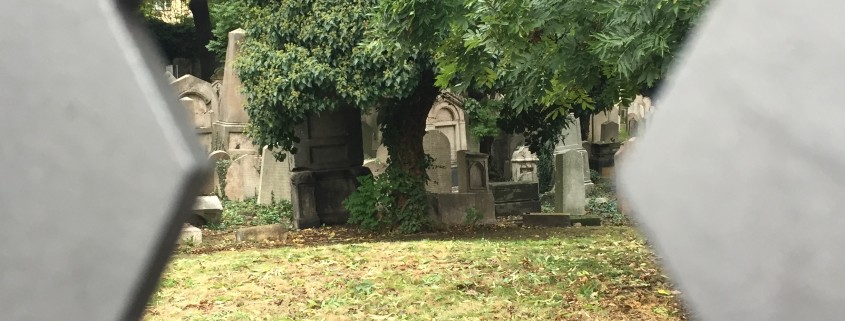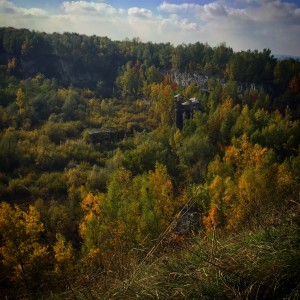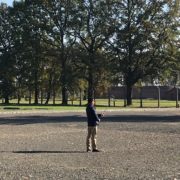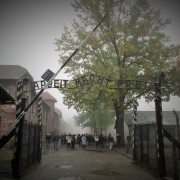I won’t write about Auschwitz.
By Farrell Greenwald Brenner
Eve Tuck and K. Wayne Yang write about the prevalence of pain-centered research in the social sciences through the lens of settler coloniality. Indigenous, Black, queer, and poor people are consumed through their narratives of pain, which are collected, examined, archived, re-written and published in much the same way that their bodies have been exploited by institutions of labor, military, and medicine. “The collection of pain narratives and the theories of change that champion the value of such narratives are so prevalent in the social sciences that one might surmise that they are indeed what the academy is about” (“R-words: Refusing research,” p. 227). Tuck and Yang understand inquiry to be part and parcel of the settler colonial imperative to undermine the Other’s knowledge of herself in order to reinforce an imperial logic of subjectivity. What interests me very much is Tuck and Yang’s second axiom of analysis: “there are some forms of knowledge that the academy doesn’t deserve” (“Unbecoming Claims: Pedagogies of Refusal in Qualitative Research,” p. 813). They articulate a strategy of refusal in order to interrupt and trouble the hegemonic order of knowledge in the social sciences—whether it be a refusal on the part of researchers to even embark on said research in the first place, or on the part of research subjects to respond to questions. This is going beyond simply humanizing or granting more autonomy to subjects; the politics of refusal reject the making of subjects altogether.
Understanding the Holocaust through a postcolonial lens is an unorthodox and complicated project. It is necessary to distinguish between the Holocaust and the settler coloniality discussed by Tuck and Yang—they are not the same kind of violences, and they have been enacted through significantly different logics and mechanisms. But I think their strategy of refusal is multidirectional, to use Michael Rothberg’s term (2009), in that these different and perhaps contrasting historical structures may be in solidarity with each other, rather than in competition. The sphere of memory is often penetrated by social scientists asking questions about identity, community, decision-making, etc. It also stands alone as its own kind of project, and participates in others, such as the (re)creation of national narratives.
I think immediately of a story shared by a professor whose mother was interviewed and recorded in a post-Holocaust memory competition. The professor was vehemently opposed to the usage of the oral history by an organization outside the family, when she herself was only learning her mother’s narrative just then. What would it mean to explode such private information, to sign away the right of ownership to your own self-knowledges? At the same time, the dominant attitude toward memory of violent histories is that we must know everything lest we forget, and that survivors have the responsibility to share the most mangled and degraded parts of themselves so that the rest of us may truly understand what happened, supposedly so that we won’t do it again. Silence becomes a shameful act of selfishness, rather than a self-preservative response emerging out of humiliation. Rarely does anyone ask how their position as a knower—a holder and arbiter of knowledge—works in relation to those who are known—that is, those who are the objects of knowledge.
Before our visit to Auschwitz, I revisited the essay “Gender and collective memory: Women and representation at Auschwitz,” by Janet Jacobs, a feminist Holocaust studies scholar (2008). Jacobs critically analyzes the ways that the Shoah has been memorialized in deeply gendered ways. Like Tuck and Yang, her goal is not to re-harvest pain narratives—rather, she seeks to expose the deeply gendered process of remembrance that has colored one of the most potent and widely-disseminated symbols of the Holocaust. To briefly sum up her argument, Jewish women are almost solely portrayed as mothers or sexual possessions (in her words, “embodied subjects of Nazi atrocities” [213]) in Auschwitz exhibits and memorials—and this tired and reductive representation foregrounds a memory of emasculation of Jewish men as impotent fathers (217-218). The price for the reification of an old anti-Semitic trope is the flat but titillating representation of the racialized woman in genocide. But most importantly, she notes that the gendered objects of Holocaust remembrance and study (especially the many photographs taken by Nazi officers of women prisoners) nearly all exist out of a state of non-consent “[and] yet, in the construction of collective memory, it is primarily their victimization that has become the means through which we study, remember and visualize the genocide of the Second World War” (223).
I won’t write about Auschwitz. I won’t write about what I saw and how much it hurt or what it is like to re-absorb the diasporic pains I used to try to scrub off my torso. I won’t tell you about the memorials or the testimonies or the site itself, and I certainly won’t describe what happened there. Not when the lines between researcher and tourist are so thin and murky. I’m not here to set the historical record straight on women in this camp, or to engage with deniers. Maybe another time, when I kick up the ocean of dust that separates me and my great-grandmother. Let me be with this body that, in one way or another, must do business with painful memories.
I won’t write about Auschwitz.
Jacobs, Janet. “Gender and Collective Memory: Women and Representation at Auschwitz.” Memory Studies 1.2 (2008): 211-25.
Rothberg, Michael. Multidirectional Memory: Remembering the Holocaust in the Age of Decolonization. Stanford, Calif: Stanford University Press, 2009.
Tuck, Eve, and K. Wayne Yang. “R-words: Refusing research.” Humanizing research: Decolonizing qualitative inquiry for youth and communities (2014): 223-247.
Tuck, Eve, and K. Wayne Yang. “Unbecoming Claims: Pedagogies of Refusal in Qualitative Research.” Qualitative Inquiry 20.6 (2014): 811-8.













